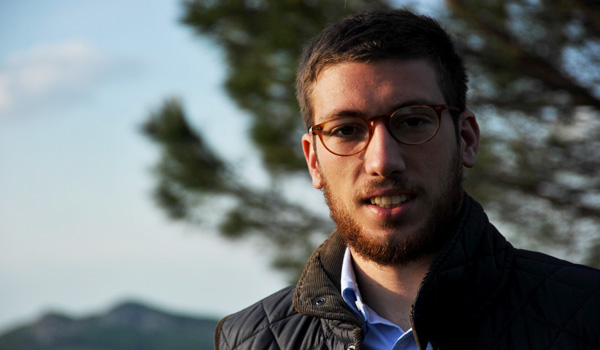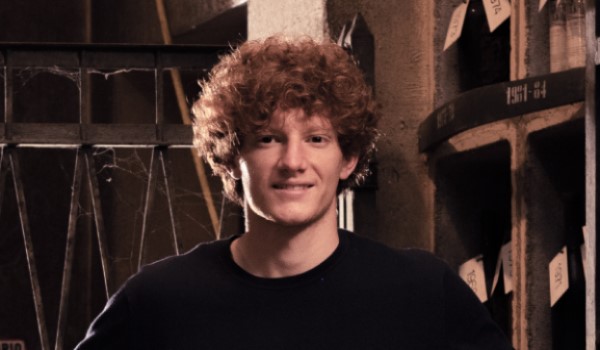
Gian Gualberto Ricci Curbastro (Lugo, January 11th, 1894 – Podgora, December 22nd, 1915)
Silver Medal for Military Valor
“Second Lieutenant of the 28th Infantry Regiment, commander of a machine-gun unit, with great skill and courage, he cooperated effectively in the success of a minor military action. Having fully hit the post of a weapon, killing a footman and burying the others, heedless of the danger to which he was exposed, he assisted his soldiers by freeing them from the rubble. While he could have been happy for the deeds he accomplished, shot to death along with those he had rescued, he left his life on the field as a valiant man.
With such, Gian Gualberto had already distinguished himself for his bravery, valor, and a high sense of duty in previous battles .
Cappelletta of Podgora, December 22nd, 1915.”
Reason for the Silver Medal for Military Valor
Gian Gualberto was the son of Raffaele and Giovanna de’ Conti Manzoni. He was a strong boy, with lively blue eyes that knew how to smile. He studied in Bologna with the Barnabite priests in the San Luigi Boarding School, and then and in the Minghetti High School. In 1913, after graduation, he joined the Faculty of Engineering, but his patriotism and military vocation called to him. Thus, in November 1914, he became a volunteer for the Military Academy of Modena.
In May 1915, with the rank of Second Lieutenant, he was assigned to the 28th Infantry Regiment stationed at Ravenna. At his request, he was immediately sent to the front and, on July 28th, he was already in battle. In August, his machine-gun unit was hit by a howitzer, but Gualberto emerged miraculously unscathed. At the time, he wrote to his father, Raffaele: “It is not death I fear: what I would not want is to die thoughtlessly, caught by surprise, without having done anything good and useful.”
Gualberto participated in all the battles of October 1915 at the Calvario and Sabotino, escaping several times from enemy grenades, and on October 25th, he wrote to his father: “I hasten to write you to reassure you of my safety during the actions of recent days. Now we have finished, and after thirty days on the front line, and five of combat, we hope in our well-earned rest.”
On December 21st, 1915, he wrote to his mother: “Merry Christmas! Actually, the fact that Christmas is only four days away, made me forget to send you my greetings on time. However, please accept them with great affection and not only for you, but also for Father, Renzo, and sister, along with another big kiss, but only to be given on the morning of the 25th.”
“At 9 am on December 22nd, we began an action with the objective to occupy an enemy trench that was bothering us: we were at an altitude of 240, more specifically, in the town of Cappelletta. Ricci Curbastro’s unit, as could have been supposed, had been discovered because the enemy had bombarded it with several shots of shrapnel, but without effect. Our machine-gunner firing squad returned fire, when an enemy grenade hit the shelters in full. A machine-gunner was killed, several were bruised, and three were buried by the soil of the collapsed shelters. Second Lieutenant Ricci Curbastro, who was just a few feet away, ran to them and, although he was certain he would be hit by the deadly fire the enemy artilleries incessantly spewed at him, he wanted to dig out those buried in the ruins who were calling for help. In fact, he managed to pull them out, and while he brought them to his refuge with comforting words, he tried to lift their fallen spirits. Unfortunately, he was then hit by one of the many grenades that had, until then, miraculously spared him, making him a victim of his courage and his good heart, and also killing the three men with him whom he was rescuing.” (From the testimony of his fellow soldier in the 28th Infantry Regiment, Lt. Leonardo De Toma). Buried in the war cemetery of Podgora, in October 1922, his remains were transferred to the family tomb in Lugo di Romagna.
Regarding the dramatic day of December 22nd, 1915, there is a beautiful testimony by Aurelius Baruzzi (Lugo di Romagna – January 9th, 1897 – Rome – March 4th, 1985), Gold Medal for Military Valor:
“Farewell, Ricci.”
“Bye, Baruzzi. Where are you going? ”
“I’m meeting with my unit on the front line.”
“You know? Tomorrow, in your sector, at the Tre Croci, there’ll be some action. I, too, will be busy because I have the job of supporting you with my machine-gun unit.”
“Well, see you tomorrow then.”
OMISSION
“Towards evening, we are replaced by another unit of the Regiment. Descending by foot to the bottom of the Podgora, I arrive in time to see, lying on two stretchers, the bodies of two officers about to be buried in the cemetery of the 28th. I recognize my friend, Ricci Curbastro. … I stop before the corpse in silent contemplation, and my thoughts go to his native Lugo, where a mother waits for news of her loved one, unaware of the tragic fate that has struck her.”
(Aurelio Baruzzi, Quel giorno a Gorizia, Volume I, Dall’inizio della guerra alla barraglia di Gorizia, published by Paolo Gaspari Editore 1999, pp. 96-101).










